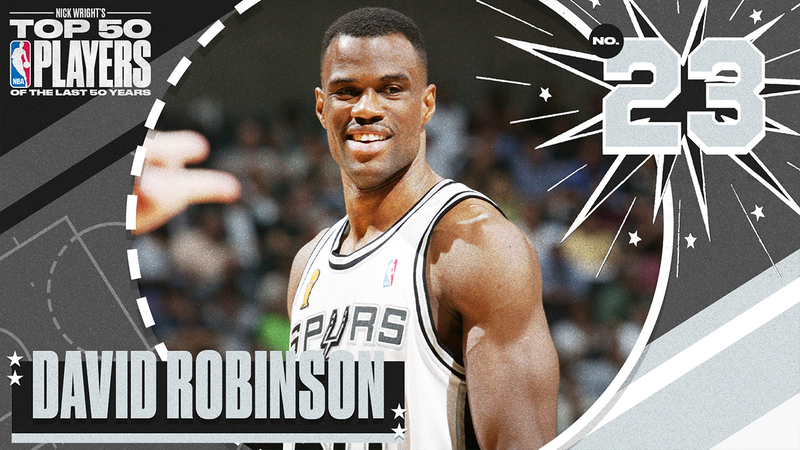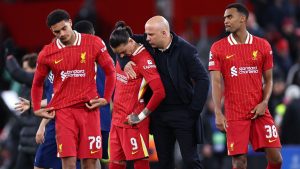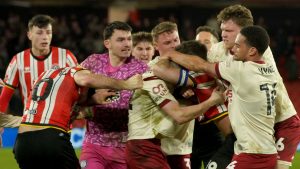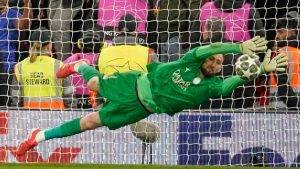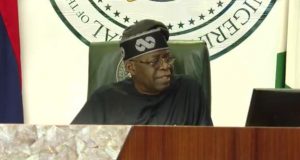Top 50 NBA players from last 50 years: David Robinson ranks No. 23


Editor’s Note: As part of a new series for his podcast, “What’s Wright with Nick Wright,” FOX Sports commentator Nick Wright is ranking the 50 best NBA players of the last 50 years. The countdown continues today with player No. 23, David Robinson.
David Robinson’s career highlights:
- 1995 MVP
- 10-time All-Star
- Four-time first-team All-NBA, two-time second team, four-time third team
- 1992 Defensive Player of the Year
- Four-time All-Defensive first team, four-time second team
- 1994 scoring champion
- 1991 rebounding champion
- 1992 blocks champion
- 1990 Rookie of the Year
There were two distinct versions of David Robinson, and perhaps neither is remembered accurately.
The younger Robinson was one of basketball’s premier players who earned just about every individual award and was complemented by occasional All-Star Sean Elliott for a Spurs franchise that enjoyed limited playoff success. The older Robinson was an occasional All-Star who faded into a productive role player and complemented burgeoning superstar Tim Duncan for a Spurs franchise that evolved into a dynasty.
“I think historically speaking, [Robinson] is a tad underrated when you really dive into what he did and what he accomplished,” Wright said. “He’s an iconic player.”
David Robinson is No. 23 on Nick Wright’s Top 50 NBA Players of the Last 50 Years
Before Tim Duncan became the face of the Spurs, David “The Admiral” Robinson was. The legendary center averaged 21.1 points and 10.6 rebounds over his 14-year career, laying the groundwork for San Antonio to become a dynasty. He won two NBA championships, an MVP award and was a 10-time All-NBA selection.
Over the course of 14 seasons, Robinson checked off just about every box. But the surrounding circumstances are worth noting. After playing four years at Navy and serving two years in the Navy, The Admiral didn’t start his NBA career until he was 24 years old.
Sculpted like a 7-foot-1 Greek god, Robinson ran like a gazelle and covered as much ground as any center ever has. He was an immediate, two-way sensation, averaging 24.3 points, 12.0 rebounds and 3.9 blocks to win Rookie of the Year. Then he led the league in rebounding. Then he won Defensive Player of the Year while averaging an NBA record 6.8 steals-plus-blocks.
Then he won the scoring title.
Then he won MVP.
The Spurs won a lot, too, just not in the postseason. They fell to three Western champs in six seasons, despite the Dream Team starter producing at his usual All-NBA level. The high point was averaging 30 and 16 with five steals-plus-blocks against the Lakers in the 1995 conference semifinals. The low point was the following series against the Rockets, as Hakeem Olajuwon completely dominated Robinson after expressing incredulity over not winning MVP.
Robinson had been a machine and early analytics darling for the first seven years of his career, averaging 26 and 13 with more than five steals-plus-blocks. He was MVP runner-up twice, second runner-up two more times and finished in the top seven every year. His player efficiency rating to this point was 27.8, which would be second all time to Michael Jordan.
“That is a bit of a testament to one of the flaws, even back in the early ’90s, with some of the basketball algorithms,” Wright said. “They’re going to reward high-efficiency, high-rebounding big men and make them seem a touch better than they are.”
Everything changed for Robinson and San Antonio in the 1996-97 campaign. He was sidelined for nearly the entire season by a foot injury, then-general manager Gregg Popovich made himself the head coach and, after the 17-win squad earned the No. 1 overall pick in the draft, the Spurs selected Tim Duncan.
The Twin Towers proved to be an ideal pairing, turning the Spurs into a perennial title contender. Though Duncan did the heavy lifting, the aging Robinson was by far the second-best player. In a Finals win over the Knicks, he averaged 17 and 12 with four blocks-plus-steals.
“The idea that he didn’t have a big role in that is ahistorical,” Wright said.
An injury to Duncan in 2000 spoiled the Spurs’ repeat bid amid Robinson entering the twilight of his career and the Shaquille O’Neal-Kobe Bryant Lakers’ emergence. Robinson’s final games took place in the 2003 Finals versus the Nets, where he put up 11 and seven with three blocks-plus-steals to help San Antonio win a second title.
“Robinson doesn’t have a bunch of eye-popping postseason moments but amazing postseason consistency,” Wright said. “I do think people these days forget about how good he was during his peak.”
Get more from National Basketball Association Follow your favorites to get information about games, news and more.


